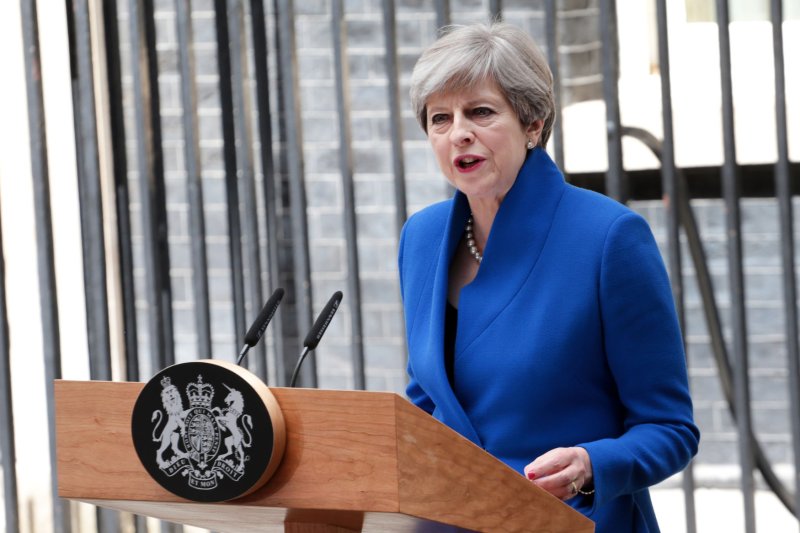Most Americans are indifferent to or unaware of the political problems in Theresa May's Britain. Photo by Hugo Philpott/UPI |
License Photo
LONDON, July 3, 2017 After the disastrous parliamentary elections in Britain that produced a coalition government, the prime ministership of Theresa May remains in freefall. The problem is that there is no obvious alternative or acceptable Conservative leader to rally the nation and stabilize the party. And many Tory politicians are fearful that even the hint of a leadership change at the top could force an election that Labor and its far left wing leader Jeremy Corbyn might win.
Given the chaotic state of America's government at both ends of Pennsylvania Avenue -- with the White House making threats against both North Korea's Kim Jong Un not to build a rocket capable of reaching America's west coast and Syria's Bashar al-Assad not to use chemical weapons and the Senate floundering over the failure to write a passable healthcare bill -- most Americans are indifferent to or unaware of the political problems in Britain. Nor is there much interest in America about understanding the consequences of Britain's vote last year to leave the European Union. Yet, what is happening in Britain is of huge importance to the United States and its future security.
In Europe, as in other parts of the world, the Trump administration is viewed with a toxic mixture of trepidation and uncertainty. Senior American officials have repeatedly told European audiences that the U.S. commitment to defend NATO as guaranteed by the founding Washington Treaty creating the alliance in 1949 is ironclad. But given President Donald Trump's "America first" policy, whatever that means, the withdrawal from the Paris climate accord and failure to mention Article 5 of that treaty (that states "an attack against one shall be considered an attack against all" at the recent NATO Brussels summit), Europeans are not convinced of where the White House really stands.
Since World War II, a "special relationship" defined the American and British alliance. That "specialness" was ensured through the longstanding nuclear deterrence partnership and, since Sept. 11, 2001, the closeness of the military-to-military relationships forged in battle in Afghanistan and Iraq. Given the duration of these wars, military ties in some ways were even closer than during World War II. As Britain's government flounders, especially over exiting the EU, and the United States is increasingly introspective and introvertive, this historic relationship is in great danger of eroding if not eventually ending.
The symbiotic nature of this special relationship should be self-evident. Britain needs America. And America needs Britain. Both countries share common values, languages, aspirations and many interests not the least of which is maintaining a liberal democracy. Further, Britain in many ways served American interests on the continent simply as one of if not the leading power in Europe. As Britain is in the process of exiting the EU, and as its military forces no longer are as dominant as they once were, Britain almost certainly will lose influence and standing in Europe. That will not be good for America.
This vacuum will be filled. Assuming Angela Merkel wins another term as chancellor -- and the hope is that she will not be as surprised as May was after the election results cost her the majority -- Germany and France under Emmanuel Macron will be primus inter pares: the first among equals. Likewise, Russia, too, will be more assertive and influential and not for the good.
Further, American focus on Syria and North Korea is likely to divert attention away from Europe with the exception of reinforcing a more hostile view of Russia. Invisible to most in the West but not the Russian military, decisions taken at NATO's 2014 Wales Summit in response to Russia's intervention into Ukraine and absorption of Ukraine are now in full bloom. Tens of thousands of NATO forces are conducting exercises from the Baltic to the Black Sea to deter Moscow from even considering any act of aggression westward into Europe.
None of these military maneuvers will be regarded as token in Moscow. Russia will respond with "active measures" also called hybrid or asymmetric warfare. Worse, these exercises have had no effect against Russian active measures of disinformation, misinformation, intimidation, political manipulation and cyber warfare and probably will lead to even greater use. And NATO has not yet devised plans to counter active measures and non-military forms of hybrid war.
Revitalizing the special relationship between America and Britain is crucial for many reasons, especially for keeping the western alliance strong. But London is consumed with the struggle of Prime Minister May and the Tories maintain power. And Washington is paralyzed with gridlock in Congress and obsessed with the president's bizarre tweets. Is this any way for two serious countries to act?
Harlan Ullman has served on the Senior Advisory Group for Supreme Allied Commander Europe (2004-16) and is a senior adviser at Washington, D.C.'s Atlantic Council, chairman of two private companies and principal author of the doctrine of shock and awe. His next book, due out this year, is "Anatomy of Failure: Why America Loses Wars It Starts," which argues failure to know and to understand the circumstances in which force is used guarantees failure. Follow him on Twitter @harlankullman.















